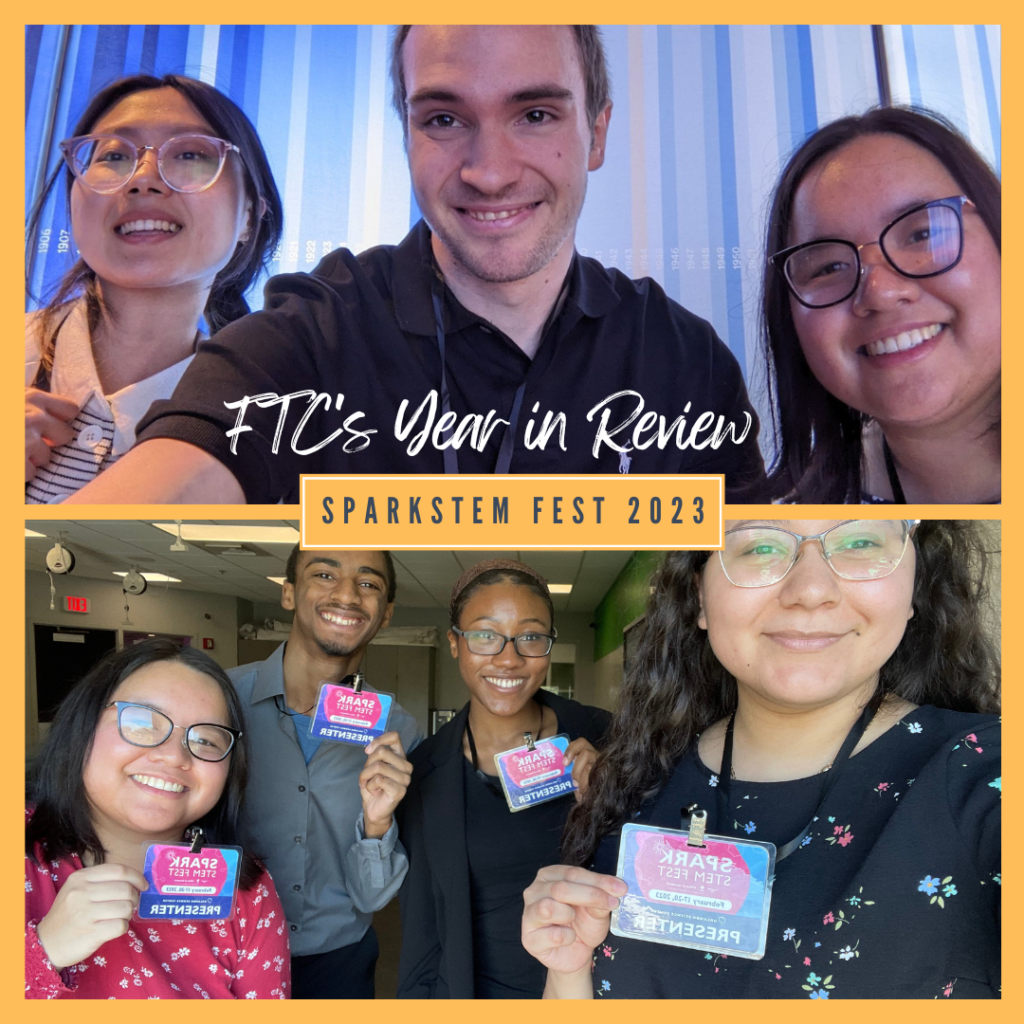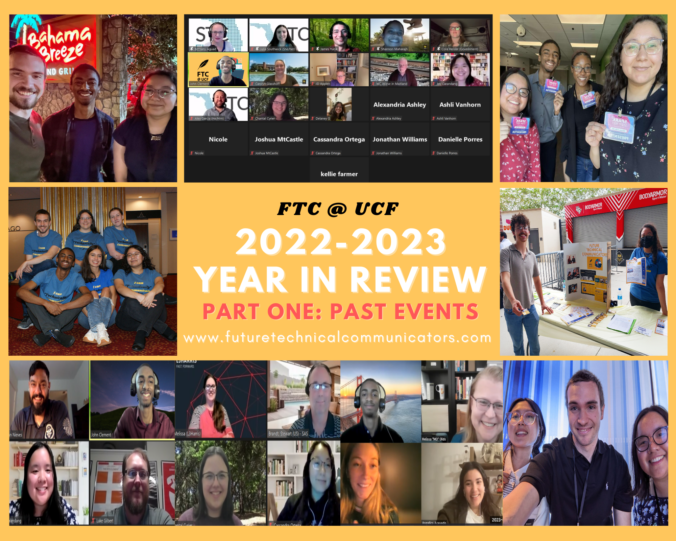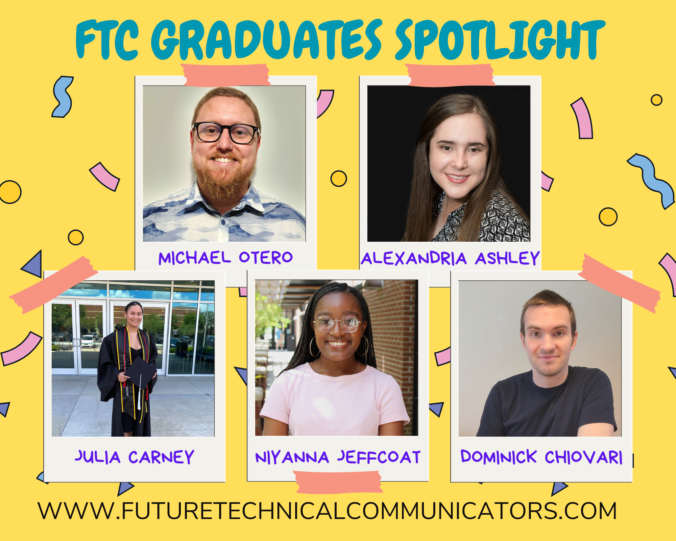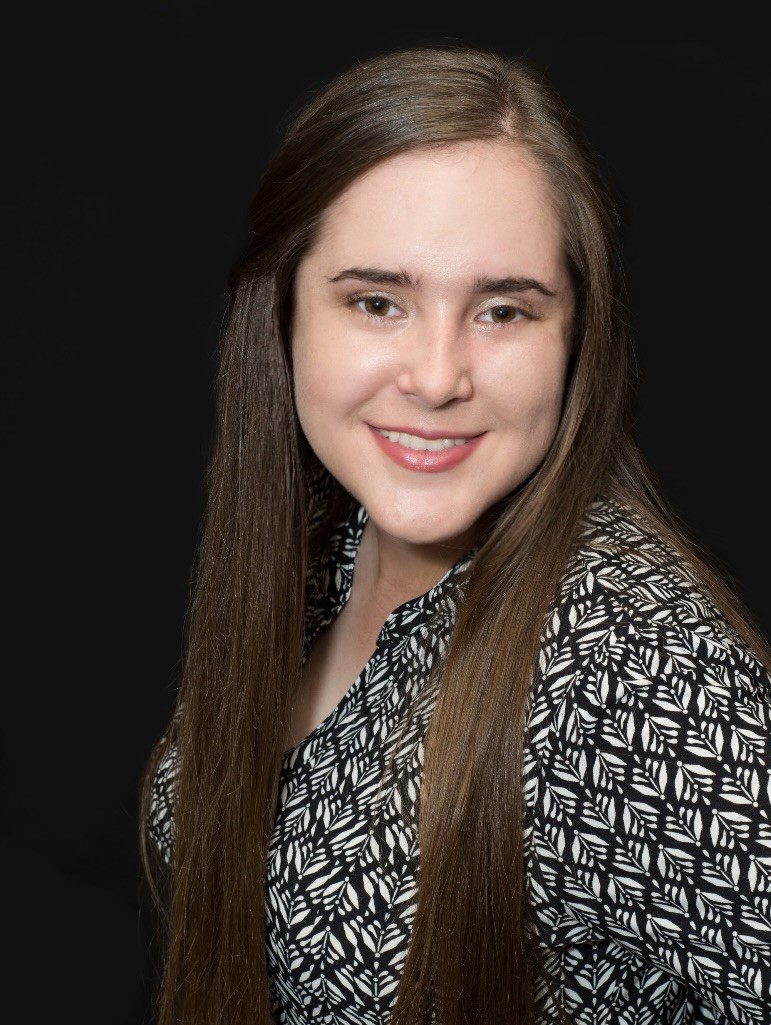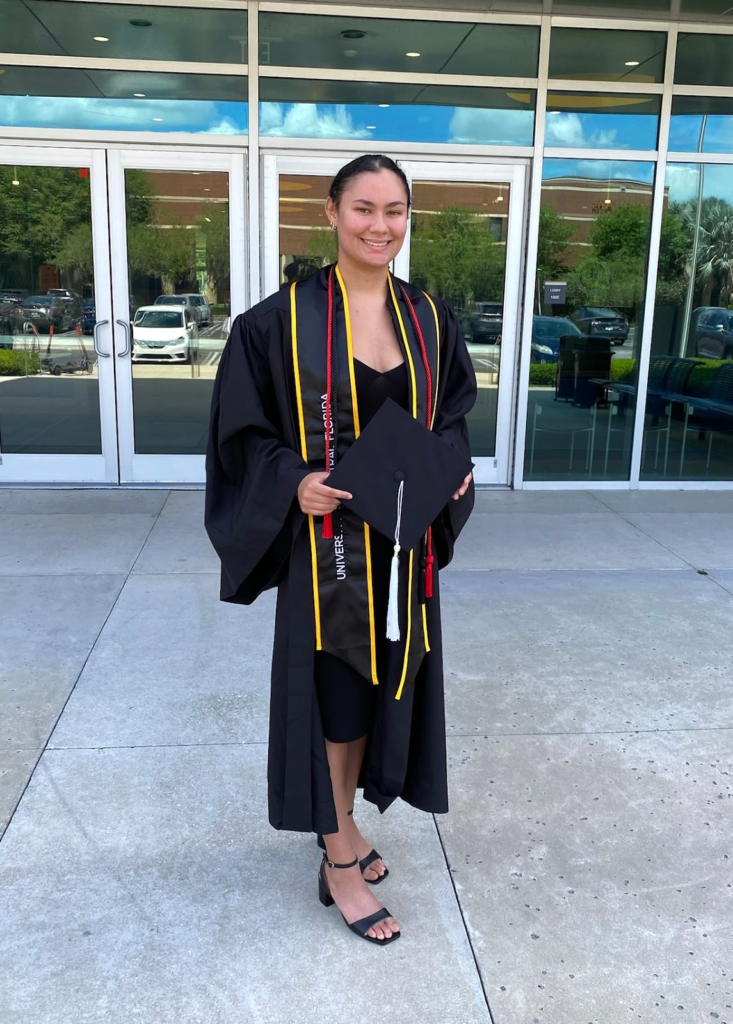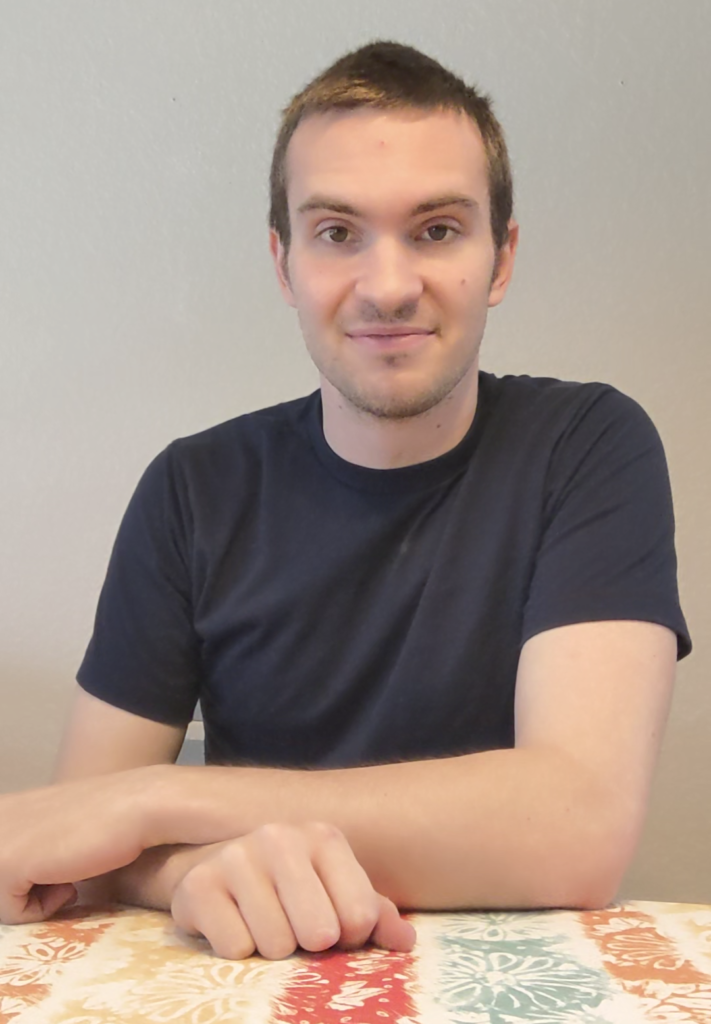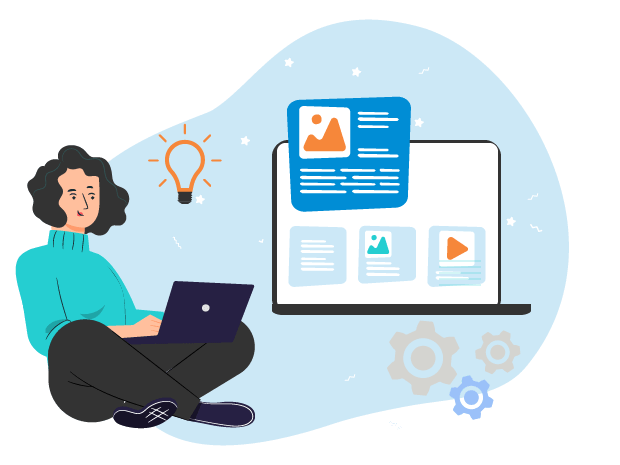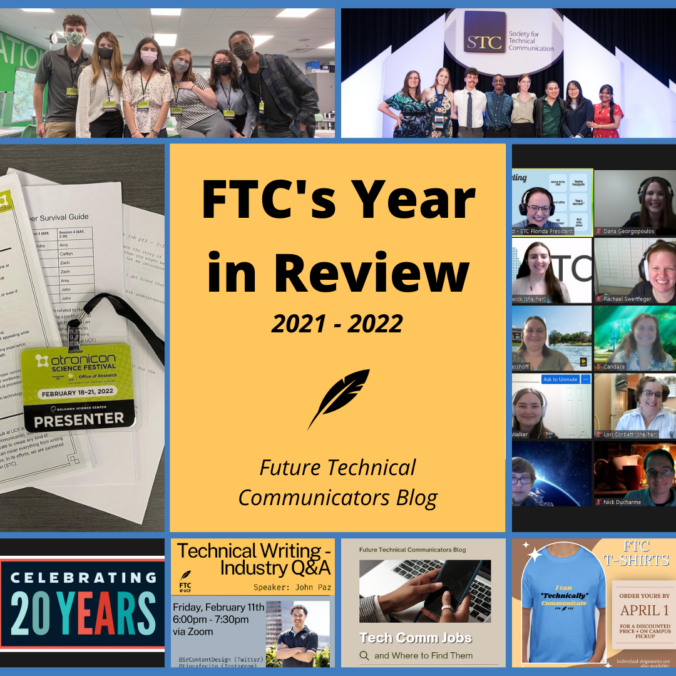We at the Future Technical Communicators (FTC) club at UCF would like to say congratulations to each one of our members who are graduating this Spring semester. You have worked incredibly hard to achieve this accomplishment, and we know that you will continue to reach new heights! As you prepare for the next chapter in your life, know that you always have a home at FTC. Additionally, please feel free to keep us updated on your tech comm journey via our FTC Discord server.
Last month, we reached out to our members asking for any graduating students if they wanted to provide a testimonial about their tech comm experience, time at UCF, and future endeavors. Read about our five of our featured Spring 23’ Graduates below!
Michael Otero (he/him/his)
Major: English – Technical Communication
Minors: (1) Mass Culture & Collective Behavior, and (2) Women’s & Gender Studies
How you got into Tech Comm
My strong suit has always been writing. Once I came across the technical writing field, I was drawn to it as a practical application for all types of industries. Soon enough, my interest in the field expanded into the user experience and other emerging aspects of technical writing.
What your experience about learning Tech Comm was like at UCF
UCF has been an incredible and accommodating environment to learn about technical communication. The professors have shown themselves to be invested in the success of their students along the way, not simply for the sake of passing the course, but also for understanding how these exercises might translate into real-world experiences. I have also found community and resources abound within FTC, and I cannot recommend it enough to anyone actively studying (or adjacent to) the technical writing field at UCF.
Any achievements or projects you would like to share
I am pleased to announce that my current employer has me working on a process revision/technical writing project with a mentor who acts as the company’s project coordinator. At its conclusion, this project could very well segue into a permanent project management and/or technical writing role in August.
Current endeavors and future plans
Longer term, I would like to perform a similar revision/technical writing process with other areas of my company, as well as begin a private venture in contracting my services, particularly for nonprofits and activism efforts seeking positive impact for marginalized communities.
Alexandria Ashley (she/her)
BA in English Technical Communication; Minor in Writing and Rhetoric
How you got into Tech Comm
I was going for a plain English degree but it didn’t feel right. I asked my dad who works at Lockheed Martin what writing jobs they had there and he briefly told me about technical writing. After hearing about this, I decided this was what I was looking for.
What your experience about learning Tech Comm was like at UCF
I had a good experience, but it could’ve been better if I had known to ask the right questions earlier.
Any achievements or projects you would like to share
I’m in the Burnett Honors College.
Current endeavors and future plans
I plan to work on getting certifications to improve my resume and am currently looking at writing-related jobs at Universal and other smaller companies. My ultimate goal is to work for Universal Creative as a technical writer/manager or work as a technical writer for Lockheed.
Julia Carney (she/her)
Major: English – Technical Communication
Minor: Writing & Rhetoric
How you got into Tech Comm
I’ve always liked to write, and I wanted to include it heavily in my career. During the process of getting my AA at Broward College, I was researching possible schools with programs I was interested in. I discovered technical communication within UCF’s English programs, and I was very interested in what would be offered in the coursework. I researched job prospects and where the field could be applied and decided to go for it.
What your experience about learning Tech Comm was like at UCF
I loved my program. As the semesters carried on, I realized how much was involved in tech comm. I thought it was mostly writing, but the amount of project management and collaboration that goes into projects can take up so much more of your time than writing ever will. I think I’ll always be learning about what’s involved.
Current endeavors and future plans
Within the last month, I accepted an offer for a full-time position at Lockheed Martin as an Associate Technical Writer and was admitted into UCF’s Technical Communication MA program! As well, I plan to work towards earning a Graduate Certificate in Instructional Design. I’m very excited to see how everything works out.
Niyanna Jeffcoat (She/Her)
Major: English – Creative Writing
Minor: Technical Communication / Certificate: Editing and Publishing
How you got into Tech Comm
I got into tech comm because I discovered that I loved writing in a way that made other people’s experiences better. I love technology and I learning about it, so I found tech comm.
What your experience about learning Tech Comm was like at UCF
My experience learning tech comm here at UCF was great, it was team-focused, collaborative, and I got to challenge myself and learn more about the industry I wanted to be a part of.
Any achievements or projects you would like to share
I’m proud of my beginner’s guide to the video game Ooblets! It was my first big document that I worked on myself. And I think it taught me a lot.
Current endeavors and future plans
Currently I’m searching for a job in the technical writing industry!
Dominick Chiovari (he, him)
Major: English – Technical Communication
How you got into Tech Comm
I was previously a biology major for several years. At some point I became dissatisfied with it, but wasn’t sure where to go. I learned about the technical communication program when my brother told me about the English degrees that UCF offered. When I found out the discipline offered valuable job skills and many career opportunities, I jumped at it. It was the best thing I ever did in college.
What your experience about learning Tech Comm was like at UCF
My first semester as a tech comms student felt completely different from my previous major, and I loved it immediately. My college experience immediately improved. Since then, I’ve learned to write and design documents, my teamwork skills improved, and I joined FTC in the fall of 2022. As of today, I am the Secretary and a member of the communications committee. I never imagined, one year ago, how phenomenally things would turn out for me just by finding technical communication. I’ve met lots of great people, found myself in FTC’s leadership, landed a mentorship, and more.
Any achievements or projects you would like to share
I am currently working with my mentor Rachael on an RPG module for SCP:RPG. It isn’t finished yet, but when it is (hopefully before the end of the semester), I would love to share it with everyone. Rachael introduced me to the DnD world, and it’s been really fun so far. She’s awesome, and I’m so grateful for her guidance.
Current endeavors and future plans
After graduation, I will apply to the tech comms master’s program for the spring of next year. Before then, I intend to get my CELTA course from Oxford TEFL, so I can teach English abroad. I haven’t decided my ultimate career path yet, but I know it will show itself in time.
